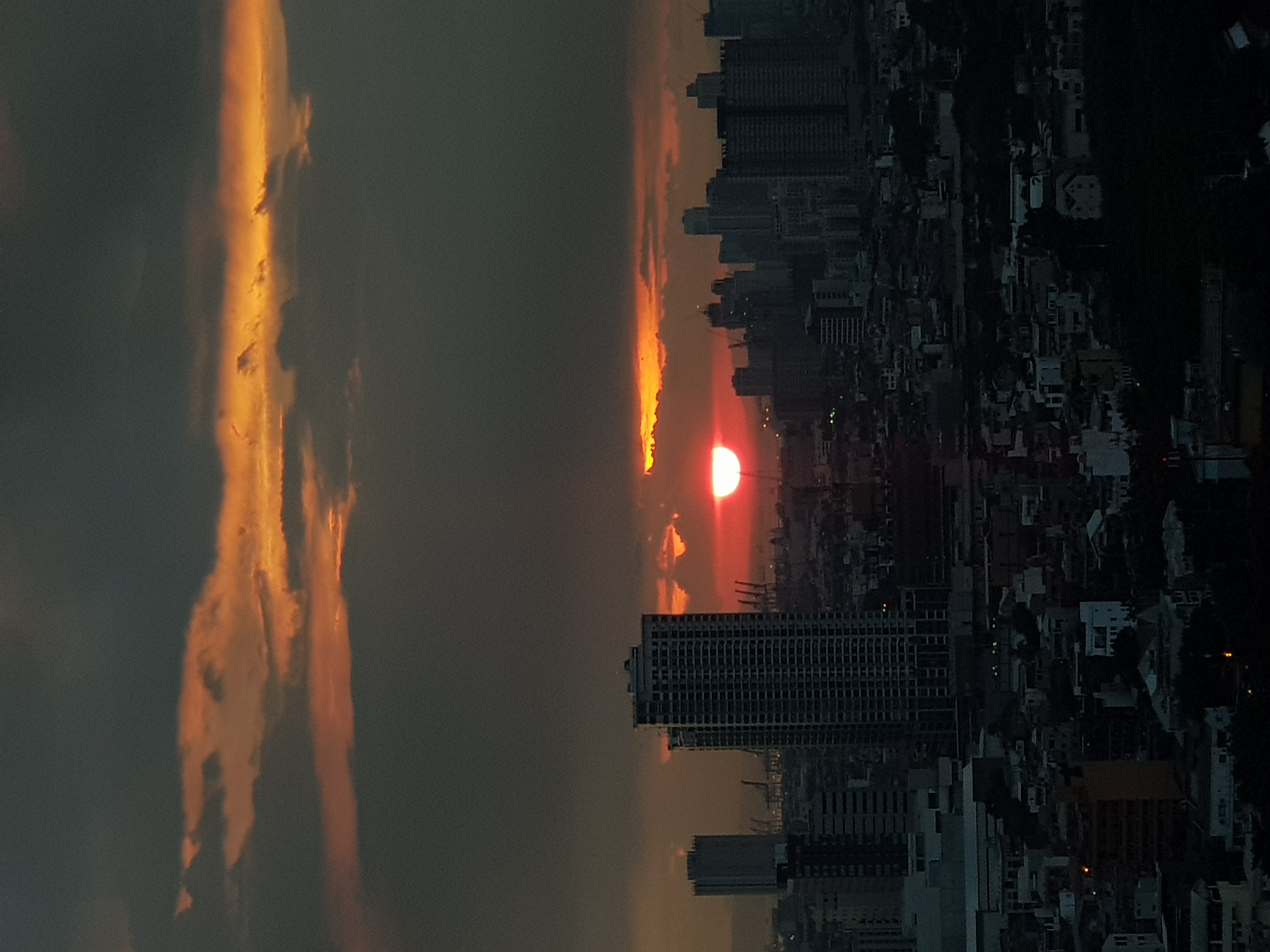
MERCADO VICENTE • PHOTO ESSAY
The Mythology of Filipino Identity
Recounting her time in England, Sai Villafuerte writes an essay on grappling with her Filipino "identity" – the conflict between honouring one’s roots and seeking a "better life" elsewhere.
Words and photos by Sai Villafuerte
8 January 2021
“Though we speak, so to say, ‘in our own name,’ of ourselves and from our own experience, nevertheless who speaks, and the subject who is spoken of, are never identical, never exactly in the same place.” – Stuart Hall
I arrived in the United Kingdom in August 2012. Between living in London and Oxford as a student, my day-to-day consisted of subconsciously sticking to a certain script. I wrote in British English. I stood on the right side of the escalator. I frequented a neighborhood café. Heck, I worked in one myself. I made friends in Hackney. Friends became colleagues. Colleagues mailed my payslips. Spent my money in Soho. Partied in Manchester. Got a new job. Met someone there. In this process of “doing as the Romans do,” I started thinking, perhaps, I am a Roman, too.
But by November 2019, I could no longer stall my return to Manila, the city where I was born.
—
It was ingrained in me early on that I must live a “better life outside.” This was not just about going to the playground and enjoying the sunshine, although that is an appropriate metaphor. If Americans aspired to a white picket fence, the “Filipino Dream” was being a galleon in the Pacific Ocean. Once I ziplined through Manila’s clogged turnpikes, there was a world out there waiting for me; not just a dusty swing, but a technicoloured jungle gym. I arrived in the United Kingdom in August 2012. Between living in London and Oxford as a student, my day-to-day consisted of subconsciously sticking to a certain script. I wrote in British English. I stood on the right side of the escalator. I frequented a neighborhood café. Heck, I worked in one myself. I made friends in Hackney. Friends became colleagues. Colleagues mailed my payslips. Spent my money in Soho. Partied in Manchester. Got a new job. Met someone there. In this process of “doing as the Romans do,” I started thinking, perhaps, I am a Roman, too.
But by November 2019, I could no longer stall my return to Manila, the city where I was born.

The UK Home Office gives foreign graduates only four months to find a job that can sponsor a work visa before forcing them to leave the country — a requirement that appeared to be reserved for the most corporate and exclusive employers. My lease ended shortly after I graduated, so I had no permanent place to live. During those four months, I was a nomad, staying in one place for no longer than five days — a situation born out of an uncertain future rather than wanderlust. Between catching the Tube in London, the peak train to Oxford and the night bus to Chipping Norton, I moved seven years’ worth of my things between these three cities — things I eventually fit in a costly storage unit about the size of a toilet cubicle.
During this period, I was also recovering from the worst burnout of my life. I suffered the knife’s edge of my master’s degree in a cutthroat university before living out of my backpack. While I hopped from one place to another, I frantically applied for jobs, going from interview to interview, receiving rejection after rejection. Even if someone wanted to hire me, employers must, by law, give precedence to British or European applicants. Not only was this demoralizing, knowing I was not enough even if I was good enough; the life I was actively building for seven years — the amount of time it took to send Apollo 8 to the Moon — was summed up to nothing but a “points-based” checklist. Within no time, I bid farewell to my loved ones and flew across eight time zones from Heathrow to Ninoy Aquino International Airport.
This is not merely a case of resentment. For many Filipinos, there exists a tug-of-war between the search for quality of life and knowing where one is “really” from. Often, this tension manifests into a way of living many Filipinos are attempting to escape — an identity built on complacency, injustice and generational trauma. “Better opportunities” motivated me out of the Philippines, but tropes about bad government, colonial mentality and the death of the individual certainly made it easier to leave.
This identity, and my interpretation of it, always risked being read in a convoluted way. When I spoke Taglish, the combination of Tagalog and English, I was not Filipino enough. When I spoke Tagalog instead of English, I was lowly. My Spanish surname made me enemy number one in the eyes of “real” Filipinos. Behind closed doors, “God was watching” and I was harassed for going against my “Filipino upbringing.” Filipinos in the Philippines mistook me for being American. A Brit thought I was Chinese, heckling “ching chang chong” from across a bus stop.
No matter what the assumption was, therein lies a universal truth: To be truly Filipino was to be estranged, like a galleon without an anchor, drifting away with the ebb and flow of the ocean.
During this period, I was also recovering from the worst burnout of my life. I suffered the knife’s edge of my master’s degree in a cutthroat university before living out of my backpack. While I hopped from one place to another, I frantically applied for jobs, going from interview to interview, receiving rejection after rejection. Even if someone wanted to hire me, employers must, by law, give precedence to British or European applicants. Not only was this demoralizing, knowing I was not enough even if I was good enough; the life I was actively building for seven years — the amount of time it took to send Apollo 8 to the Moon — was summed up to nothing but a “points-based” checklist. Within no time, I bid farewell to my loved ones and flew across eight time zones from Heathrow to Ninoy Aquino International Airport.
This is not merely a case of resentment. For many Filipinos, there exists a tug-of-war between the search for quality of life and knowing where one is “really” from. Often, this tension manifests into a way of living many Filipinos are attempting to escape — an identity built on complacency, injustice and generational trauma. “Better opportunities” motivated me out of the Philippines, but tropes about bad government, colonial mentality and the death of the individual certainly made it easier to leave.
This identity, and my interpretation of it, always risked being read in a convoluted way. When I spoke Taglish, the combination of Tagalog and English, I was not Filipino enough. When I spoke Tagalog instead of English, I was lowly. My Spanish surname made me enemy number one in the eyes of “real” Filipinos. Behind closed doors, “God was watching” and I was harassed for going against my “Filipino upbringing.” Filipinos in the Philippines mistook me for being American. A Brit thought I was Chinese, heckling “ching chang chong” from across a bus stop.
No matter what the assumption was, therein lies a universal truth: To be truly Filipino was to be estranged, like a galleon without an anchor, drifting away with the ebb and flow of the ocean.

Nevertheless, this condition of not belonging anywhere has an allure — a nostalgia for a place never traversed; a depth in one’s self so rich and nuanced, it is waiting to be excavated.
Shortly after I moved to England, I began my career as a freelance journalist for numerous British publications. It took me no time to adapt — a tendency brought on by the need to fit into a new culture. However, I always circled back to the same stories of Filipinos grappling with their own culture, which said more about me than the stories themselves. I felt a peculiar comfort, too, inside the dark intensity of a nightclub, entranced by the music amongst sweaty dancers. It reminded me of staying out late at night as a teenager, savoring the taste of my forbidden freedom, exposed to the innards of Metro Manila. I finally had this “better life outside,” yet this search for what was out there, of who I could be, was unwavering.
And herein lies the crux of Filipino identity and its mythology. Who we are is a matter of both the past and the future. Being Filipino is just one of the things I am, albeit a large one, and not one ancestor, personality trait or experience can ever capture all its ruptures. Our bodies constitute a story and, like all stories, the Filipino one shifts in shape, cuts across space and changes over time. To realize this entropy is to seize opportunity in chaos.
One day, I will cycle through Regent’s Canal again and slurp oysters at Broadway Market. My friends and I will reunite on the dancefloor and take the train of shame from Bristol. I will long for those cold winter evenings by the Cornish seaside, like how I longed for this tropical heat in the Pacific Ring of Fire.
But until then, I can find solace in my own skin — being and becoming.
Shortly after I moved to England, I began my career as a freelance journalist for numerous British publications. It took me no time to adapt — a tendency brought on by the need to fit into a new culture. However, I always circled back to the same stories of Filipinos grappling with their own culture, which said more about me than the stories themselves. I felt a peculiar comfort, too, inside the dark intensity of a nightclub, entranced by the music amongst sweaty dancers. It reminded me of staying out late at night as a teenager, savoring the taste of my forbidden freedom, exposed to the innards of Metro Manila. I finally had this “better life outside,” yet this search for what was out there, of who I could be, was unwavering.
And herein lies the crux of Filipino identity and its mythology. Who we are is a matter of both the past and the future. Being Filipino is just one of the things I am, albeit a large one, and not one ancestor, personality trait or experience can ever capture all its ruptures. Our bodies constitute a story and, like all stories, the Filipino one shifts in shape, cuts across space and changes over time. To realize this entropy is to seize opportunity in chaos.
One day, I will cycle through Regent’s Canal again and slurp oysters at Broadway Market. My friends and I will reunite on the dancefloor and take the train of shame from Bristol. I will long for those cold winter evenings by the Cornish seaside, like how I longed for this tropical heat in the Pacific Ring of Fire.
But until then, I can find solace in my own skin — being and becoming.

Sai Villafuerte
Multimedia Journalist
Multimedia Journalist